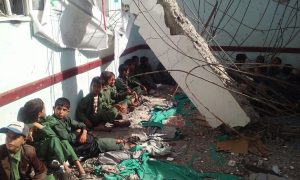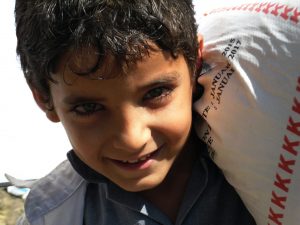Yemen (MNN) — Every ten minutes, a child in Yemen dies from a preventable illness, according to UNICEF. The country’s civil war continues to exacerbate the poverty here, and add to the thousands of deaths that have occurred over the last two years. Yemen is one of the four countries included in what’s being called the largest humanitarian crisis in many decades. And yet, Yemen receives little attention compared to what’s going on in Iraq and Syria.
PUBLISHED ON 26 April, 2017 BY Julie Bourdon
Rachel Elwood of World Gospel Mission says, “The war in Yemen has been going on for two years now, and it doesn’t get the press that other conflicts like Syria and Iraq have gotten.”

(Photo courtesy of Rachel Elwood)
She says there are many reasons why this is so, but it’s definitely not helping bring relief to the nation.
“Yemen was, prior to the war, one of the poorest — if not the poorest country — in the Middle East. The poverty rate at that time was about a third, so 34 percent. But it’s doubled in the last two years. It’s doubled to 62 percent of people living in poverty,” she explains.
What this means is a stunning 70 percent of Yemen’s people are in need of aid. Over 14 million people are considered food insecure, and almost 20 million do not have access to clean drinking water. That’s out of a total population of 27 million. World leaders are asking for help. Yesterday, an aid summit was held to try and raise funding for aid.
And it’s not just basic provisions that have been scarce, but long-term necessities, as well. According to World Gospel Mission, more than 1,500 schools have been damaged or destroyed in the war. That, combined with the number of children internally displaced and the teacher salaries that have not been paid, means that more than 30 percent of school-aged children are currently out of school.
Elwood says, “Millions don’t have access to healthcare. There are just a lot of long-term consequences of lack of infrastructure, lack of a cohesive government, and brutal conflict.”
Deep-rooted problems
Elwood says there is no easy fix to the complexities of the situation, but there is still the opportunity to help.
“We can utilize the partners we have in Yemen, and WGM has some partners they’ve worked with for many years. They’re trusted, local NGOs and we’re able to help them reach out to their people to equip the people of faith that live in Yemen that are committed to stay and rebuild their country.”
World Gospel Mission is helping provide food baskets, shelter, first aid training, and spread information about basic medical and hygiene care. They’re also helping fill the education gap.
“We have been able to mobilize educators in Yemen — rural places where there’s not a lot of infrastructure — who have been able to restart classes and help those children, especially girls, restart their education,” Elwood says.
Network of faith workers
In situations like this, the Body of Christ becomes an extremely viable network to distribute aid and hope. World Gospel Mission and their partners on the ground are working with Christians in their villages to coordinate relief efforts.
And it’s on this platform that the Gospel can be shared.
“People are listening because they’re getting true help, and that’s making a huge statement. When you’ve got the Middle East, it’s torn about by sectarian violence, people are looking for another way and another answer.”

(Photo courtesy of Rachel Elwood)
Their partners have to be wise in how they share their faith as they do face some danger. As they act as the hands and feet of Jesus in Yemen, can you walk alongside them?
Elwood says, “Your prayers are so important. We couldn’t do anything without your prayers. Pray for God’s favor in interaction; pray for safety. You know, we don’t believe God guarantees a life of safety. But we want to make sure our partners there in Yemen are safe and are able to continue in their work.”
Also, pray for those who receive aid to also hear about Jesus and the hope He has.
Additionally, you can help fund this work. Click here to do so.
She leaves us with this final thought: “Our hope in all this is to empower the indigenous people of faith, the indigenous believers in Yemen to really be empowered to respond to the needs in their community. That’s really why we do it. We want to provide for physical needs. But on top of that, it’s just praying that the Church in Yemen will really rise, and that God’s light will shine in these dark places.”
